Career Path Plan in Tourism, Hospitality & Events - THE101 Plan
VerifiedAdded on 2023/06/03
|13
|2658
|488
Report
AI Summary
This report outlines a career path plan focused on becoming a Hotel Manager at Jonah's Restaurant Australia. It includes a personal assessment using the D.I.S.C analysis and the Big Five Personality Test, detailing strengths and weaknesses relevant to hotel management. The plan identifies key career milestones, such as comprehending hotel management terms and recognizing market demands, and proposes development activities across social, intellectual, and physical domains, with a timeline for achievement. The goal is to enhance skills in teamwork, interaction, and meeting requirements to align with the desired career trajectory in the tourism, hospitality, and events industry. Desklib provides resources for students including similar past papers and solved assignments.
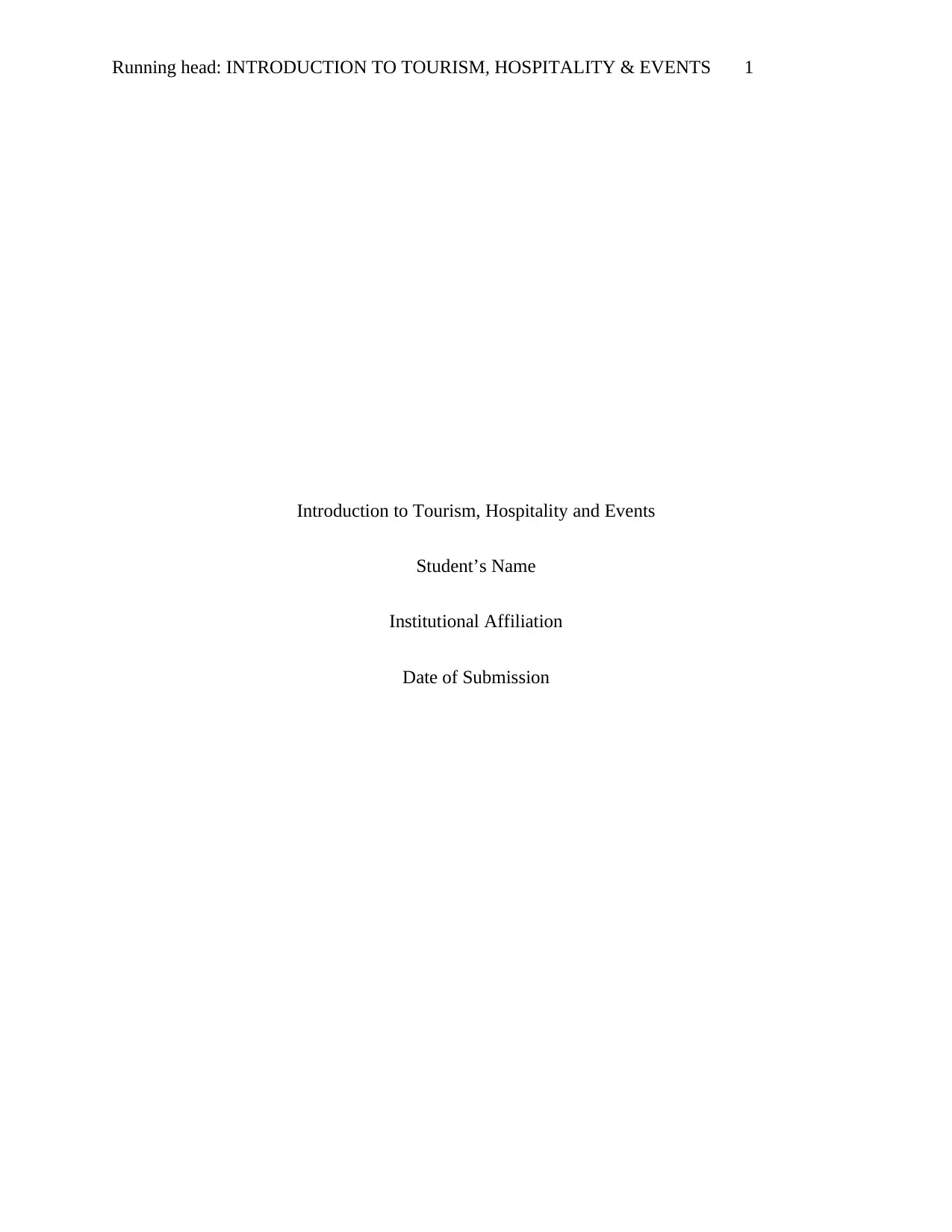
Running head: INTRODUCTION TO TOURISM, HOSPITALITY & EVENTS 1
Introduction to Tourism, Hospitality and Events
Student’s Name
Institutional Affiliation
Date of Submission
Introduction to Tourism, Hospitality and Events
Student’s Name
Institutional Affiliation
Date of Submission
Paraphrase This Document
Need a fresh take? Get an instant paraphrase of this document with our AI Paraphraser
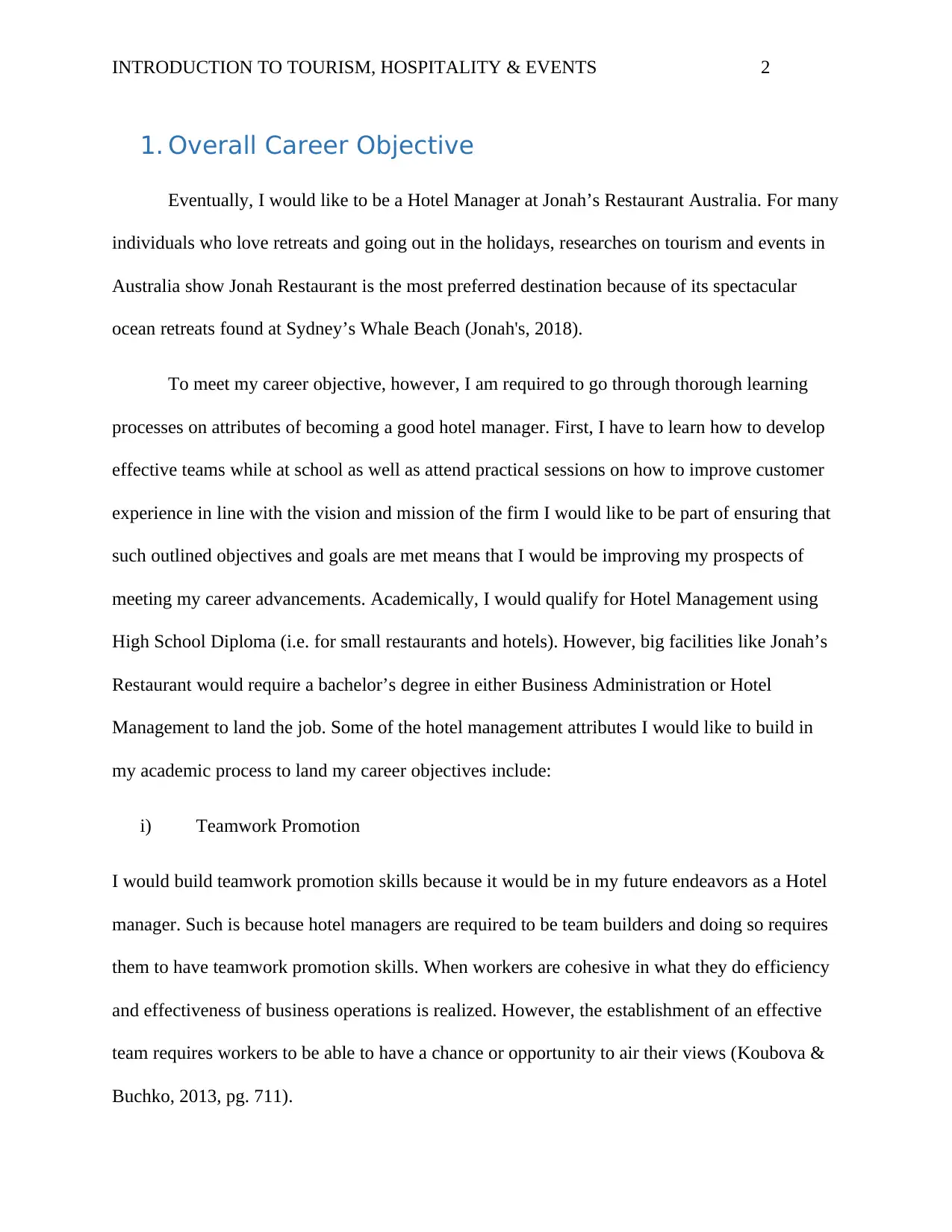
INTRODUCTION TO TOURISM, HOSPITALITY & EVENTS 2
1. Overall Career Objective
Eventually, I would like to be a Hotel Manager at Jonah’s Restaurant Australia. For many
individuals who love retreats and going out in the holidays, researches on tourism and events in
Australia show Jonah Restaurant is the most preferred destination because of its spectacular
ocean retreats found at Sydney’s Whale Beach (Jonah's, 2018).
To meet my career objective, however, I am required to go through thorough learning
processes on attributes of becoming a good hotel manager. First, I have to learn how to develop
effective teams while at school as well as attend practical sessions on how to improve customer
experience in line with the vision and mission of the firm I would like to be part of ensuring that
such outlined objectives and goals are met means that I would be improving my prospects of
meeting my career advancements. Academically, I would qualify for Hotel Management using
High School Diploma (i.e. for small restaurants and hotels). However, big facilities like Jonah’s
Restaurant would require a bachelor’s degree in either Business Administration or Hotel
Management to land the job. Some of the hotel management attributes I would like to build in
my academic process to land my career objectives include:
i) Teamwork Promotion
I would build teamwork promotion skills because it would be in my future endeavors as a Hotel
manager. Such is because hotel managers are required to be team builders and doing so requires
them to have teamwork promotion skills. When workers are cohesive in what they do efficiency
and effectiveness of business operations is realized. However, the establishment of an effective
team requires workers to be able to have a chance or opportunity to air their views (Koubova &
Buchko, 2013, pg. 711).
1. Overall Career Objective
Eventually, I would like to be a Hotel Manager at Jonah’s Restaurant Australia. For many
individuals who love retreats and going out in the holidays, researches on tourism and events in
Australia show Jonah Restaurant is the most preferred destination because of its spectacular
ocean retreats found at Sydney’s Whale Beach (Jonah's, 2018).
To meet my career objective, however, I am required to go through thorough learning
processes on attributes of becoming a good hotel manager. First, I have to learn how to develop
effective teams while at school as well as attend practical sessions on how to improve customer
experience in line with the vision and mission of the firm I would like to be part of ensuring that
such outlined objectives and goals are met means that I would be improving my prospects of
meeting my career advancements. Academically, I would qualify for Hotel Management using
High School Diploma (i.e. for small restaurants and hotels). However, big facilities like Jonah’s
Restaurant would require a bachelor’s degree in either Business Administration or Hotel
Management to land the job. Some of the hotel management attributes I would like to build in
my academic process to land my career objectives include:
i) Teamwork Promotion
I would build teamwork promotion skills because it would be in my future endeavors as a Hotel
manager. Such is because hotel managers are required to be team builders and doing so requires
them to have teamwork promotion skills. When workers are cohesive in what they do efficiency
and effectiveness of business operations is realized. However, the establishment of an effective
team requires workers to be able to have a chance or opportunity to air their views (Koubova &
Buchko, 2013, pg. 711).
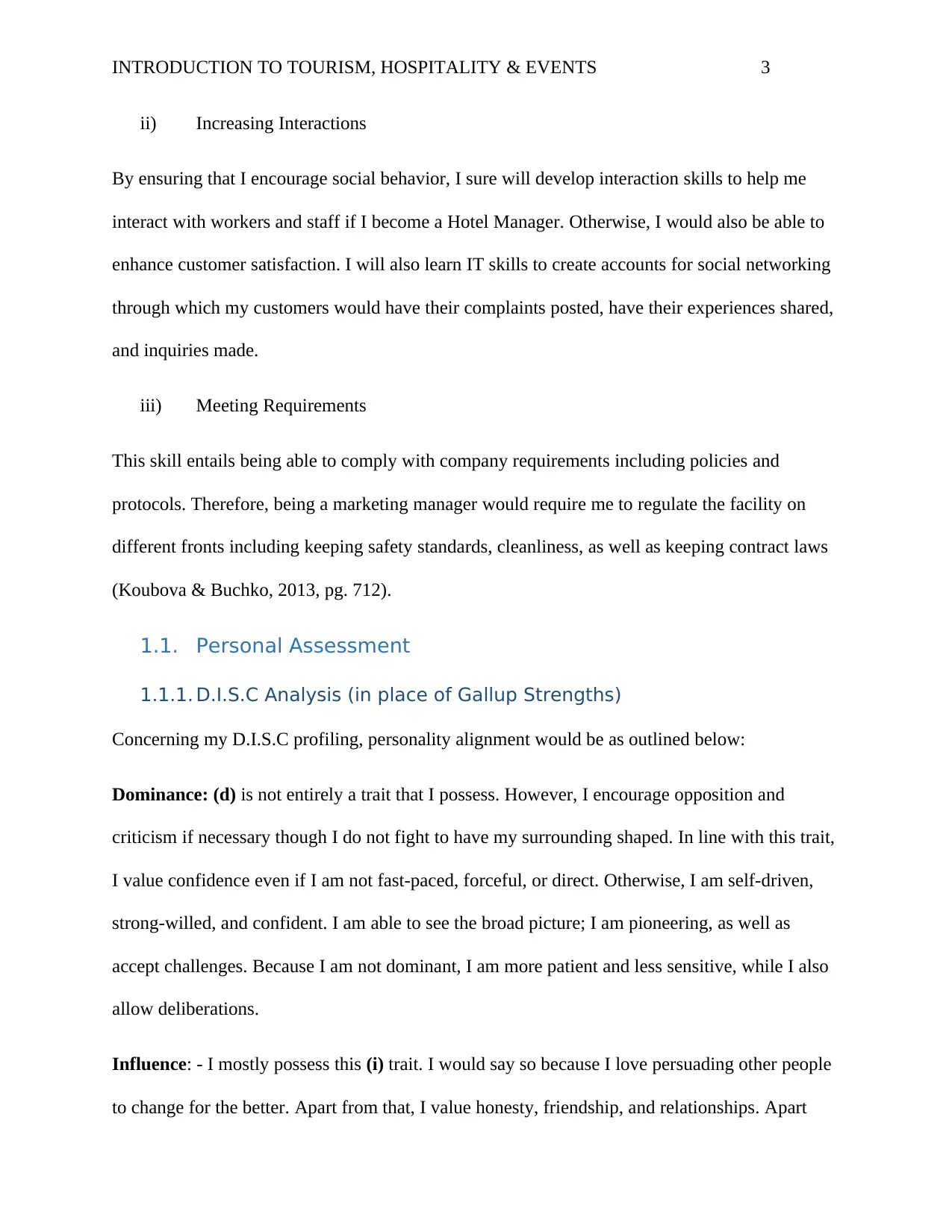
INTRODUCTION TO TOURISM, HOSPITALITY & EVENTS 3
ii) Increasing Interactions
By ensuring that I encourage social behavior, I sure will develop interaction skills to help me
interact with workers and staff if I become a Hotel Manager. Otherwise, I would also be able to
enhance customer satisfaction. I will also learn IT skills to create accounts for social networking
through which my customers would have their complaints posted, have their experiences shared,
and inquiries made.
iii) Meeting Requirements
This skill entails being able to comply with company requirements including policies and
protocols. Therefore, being a marketing manager would require me to regulate the facility on
different fronts including keeping safety standards, cleanliness, as well as keeping contract laws
(Koubova & Buchko, 2013, pg. 712).
1.1. Personal Assessment
1.1.1. D.I.S.C Analysis (in place of Gallup Strengths)
Concerning my D.I.S.C profiling, personality alignment would be as outlined below:
Dominance: (d) is not entirely a trait that I possess. However, I encourage opposition and
criticism if necessary though I do not fight to have my surrounding shaped. In line with this trait,
I value confidence even if I am not fast-paced, forceful, or direct. Otherwise, I am self-driven,
strong-willed, and confident. I am able to see the broad picture; I am pioneering, as well as
accept challenges. Because I am not dominant, I am more patient and less sensitive, while I also
allow deliberations.
Influence: - I mostly possess this (i) trait. I would say so because I love persuading other people
to change for the better. Apart from that, I value honesty, friendship, and relationships. Apart
ii) Increasing Interactions
By ensuring that I encourage social behavior, I sure will develop interaction skills to help me
interact with workers and staff if I become a Hotel Manager. Otherwise, I would also be able to
enhance customer satisfaction. I will also learn IT skills to create accounts for social networking
through which my customers would have their complaints posted, have their experiences shared,
and inquiries made.
iii) Meeting Requirements
This skill entails being able to comply with company requirements including policies and
protocols. Therefore, being a marketing manager would require me to regulate the facility on
different fronts including keeping safety standards, cleanliness, as well as keeping contract laws
(Koubova & Buchko, 2013, pg. 712).
1.1. Personal Assessment
1.1.1. D.I.S.C Analysis (in place of Gallup Strengths)
Concerning my D.I.S.C profiling, personality alignment would be as outlined below:
Dominance: (d) is not entirely a trait that I possess. However, I encourage opposition and
criticism if necessary though I do not fight to have my surrounding shaped. In line with this trait,
I value confidence even if I am not fast-paced, forceful, or direct. Otherwise, I am self-driven,
strong-willed, and confident. I am able to see the broad picture; I am pioneering, as well as
accept challenges. Because I am not dominant, I am more patient and less sensitive, while I also
allow deliberations.
Influence: - I mostly possess this (i) trait. I would say so because I love persuading other people
to change for the better. Apart from that, I value honesty, friendship, and relationships. Apart
⊘ This is a preview!⊘
Do you want full access?
Subscribe today to unlock all pages.

Trusted by 1+ million students worldwide
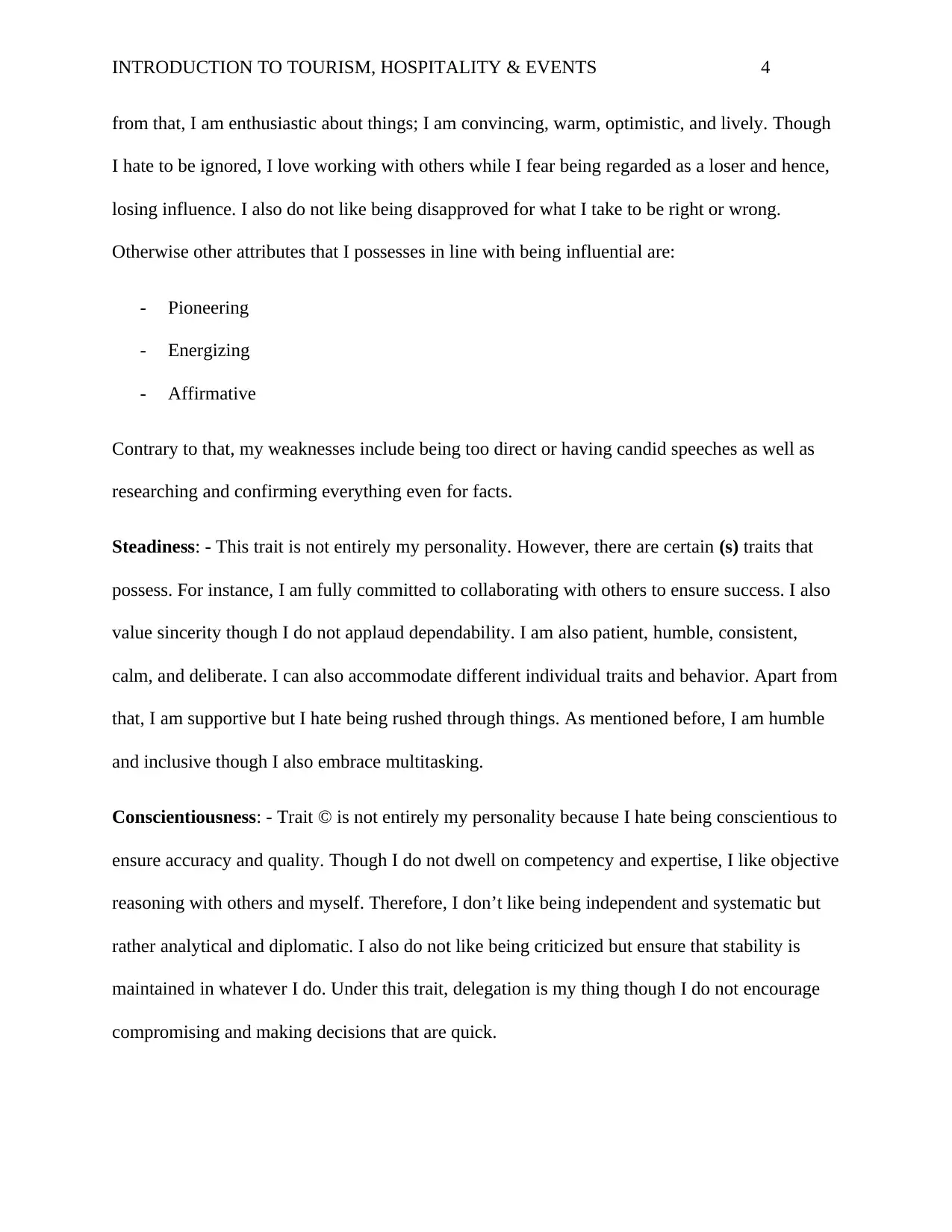
INTRODUCTION TO TOURISM, HOSPITALITY & EVENTS 4
from that, I am enthusiastic about things; I am convincing, warm, optimistic, and lively. Though
I hate to be ignored, I love working with others while I fear being regarded as a loser and hence,
losing influence. I also do not like being disapproved for what I take to be right or wrong.
Otherwise other attributes that I possesses in line with being influential are:
- Pioneering
- Energizing
- Affirmative
Contrary to that, my weaknesses include being too direct or having candid speeches as well as
researching and confirming everything even for facts.
Steadiness: - This trait is not entirely my personality. However, there are certain (s) traits that
possess. For instance, I am fully committed to collaborating with others to ensure success. I also
value sincerity though I do not applaud dependability. I am also patient, humble, consistent,
calm, and deliberate. I can also accommodate different individual traits and behavior. Apart from
that, I am supportive but I hate being rushed through things. As mentioned before, I am humble
and inclusive though I also embrace multitasking.
Conscientiousness: - Trait © is not entirely my personality because I hate being conscientious to
ensure accuracy and quality. Though I do not dwell on competency and expertise, I like objective
reasoning with others and myself. Therefore, I don’t like being independent and systematic but
rather analytical and diplomatic. I also do not like being criticized but ensure that stability is
maintained in whatever I do. Under this trait, delegation is my thing though I do not encourage
compromising and making decisions that are quick.
from that, I am enthusiastic about things; I am convincing, warm, optimistic, and lively. Though
I hate to be ignored, I love working with others while I fear being regarded as a loser and hence,
losing influence. I also do not like being disapproved for what I take to be right or wrong.
Otherwise other attributes that I possesses in line with being influential are:
- Pioneering
- Energizing
- Affirmative
Contrary to that, my weaknesses include being too direct or having candid speeches as well as
researching and confirming everything even for facts.
Steadiness: - This trait is not entirely my personality. However, there are certain (s) traits that
possess. For instance, I am fully committed to collaborating with others to ensure success. I also
value sincerity though I do not applaud dependability. I am also patient, humble, consistent,
calm, and deliberate. I can also accommodate different individual traits and behavior. Apart from
that, I am supportive but I hate being rushed through things. As mentioned before, I am humble
and inclusive though I also embrace multitasking.
Conscientiousness: - Trait © is not entirely my personality because I hate being conscientious to
ensure accuracy and quality. Though I do not dwell on competency and expertise, I like objective
reasoning with others and myself. Therefore, I don’t like being independent and systematic but
rather analytical and diplomatic. I also do not like being criticized but ensure that stability is
maintained in whatever I do. Under this trait, delegation is my thing though I do not encourage
compromising and making decisions that are quick.
Paraphrase This Document
Need a fresh take? Get an instant paraphrase of this document with our AI Paraphraser
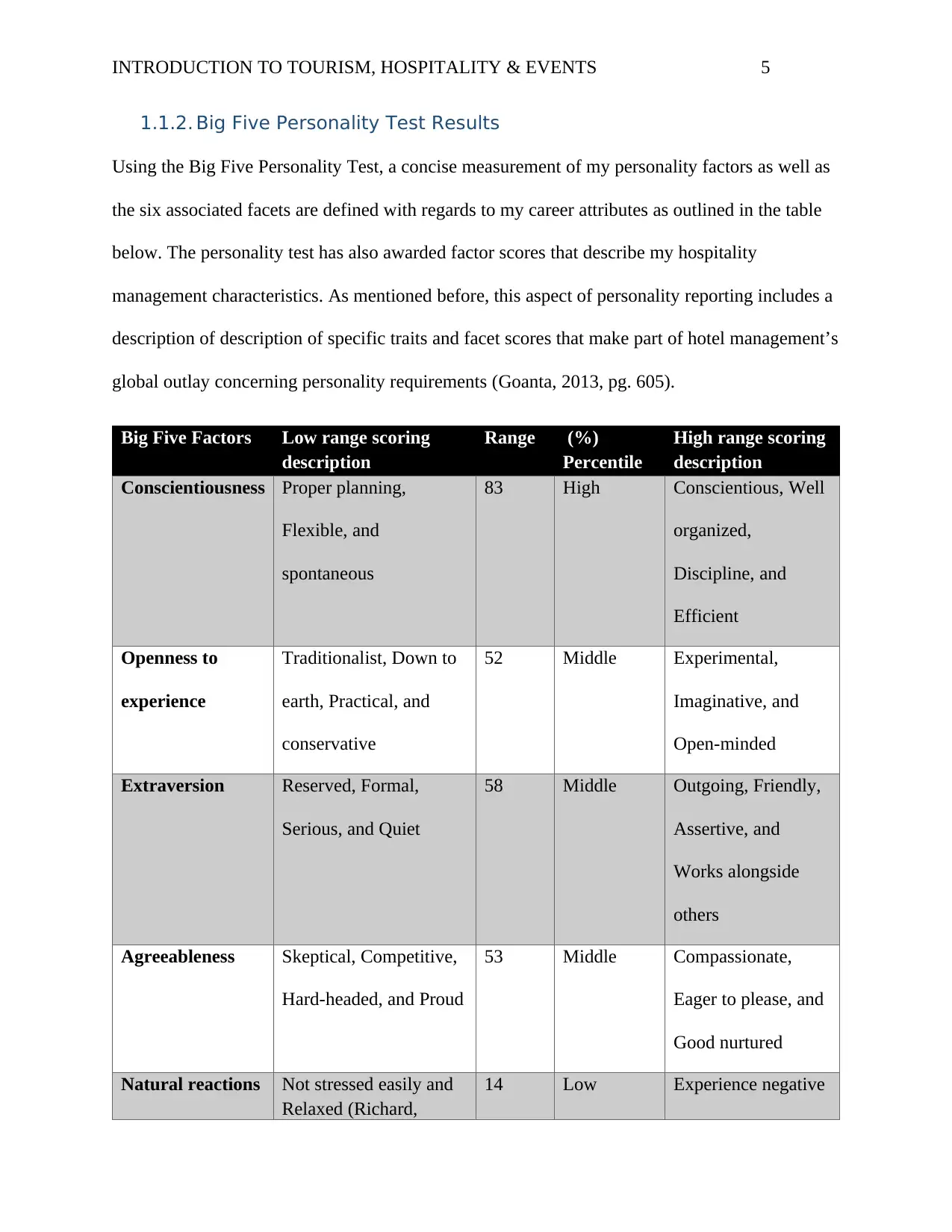
INTRODUCTION TO TOURISM, HOSPITALITY & EVENTS 5
1.1.2. Big Five Personality Test Results
Using the Big Five Personality Test, a concise measurement of my personality factors as well as
the six associated facets are defined with regards to my career attributes as outlined in the table
below. The personality test has also awarded factor scores that describe my hospitality
management characteristics. As mentioned before, this aspect of personality reporting includes a
description of description of specific traits and facet scores that make part of hotel management’s
global outlay concerning personality requirements (Goanta, 2013, pg. 605).
Big Five Factors Low range scoring
description
Range (%)
Percentile
High range scoring
description
Conscientiousness Proper planning,
Flexible, and
spontaneous
83 High Conscientious, Well
organized,
Discipline, and
Efficient
Openness to
experience
Traditionalist, Down to
earth, Practical, and
conservative
52 Middle Experimental,
Imaginative, and
Open-minded
Extraversion Reserved, Formal,
Serious, and Quiet
58 Middle Outgoing, Friendly,
Assertive, and
Works alongside
others
Agreeableness Skeptical, Competitive,
Hard-headed, and Proud
53 Middle Compassionate,
Eager to please, and
Good nurtured
Natural reactions Not stressed easily and
Relaxed (Richard,
14 Low Experience negative
1.1.2. Big Five Personality Test Results
Using the Big Five Personality Test, a concise measurement of my personality factors as well as
the six associated facets are defined with regards to my career attributes as outlined in the table
below. The personality test has also awarded factor scores that describe my hospitality
management characteristics. As mentioned before, this aspect of personality reporting includes a
description of description of specific traits and facet scores that make part of hotel management’s
global outlay concerning personality requirements (Goanta, 2013, pg. 605).
Big Five Factors Low range scoring
description
Range (%)
Percentile
High range scoring
description
Conscientiousness Proper planning,
Flexible, and
spontaneous
83 High Conscientious, Well
organized,
Discipline, and
Efficient
Openness to
experience
Traditionalist, Down to
earth, Practical, and
conservative
52 Middle Experimental,
Imaginative, and
Open-minded
Extraversion Reserved, Formal,
Serious, and Quiet
58 Middle Outgoing, Friendly,
Assertive, and
Works alongside
others
Agreeableness Skeptical, Competitive,
Hard-headed, and Proud
53 Middle Compassionate,
Eager to please, and
Good nurtured
Natural reactions Not stressed easily and
Relaxed (Richard,
14 Low Experience negative
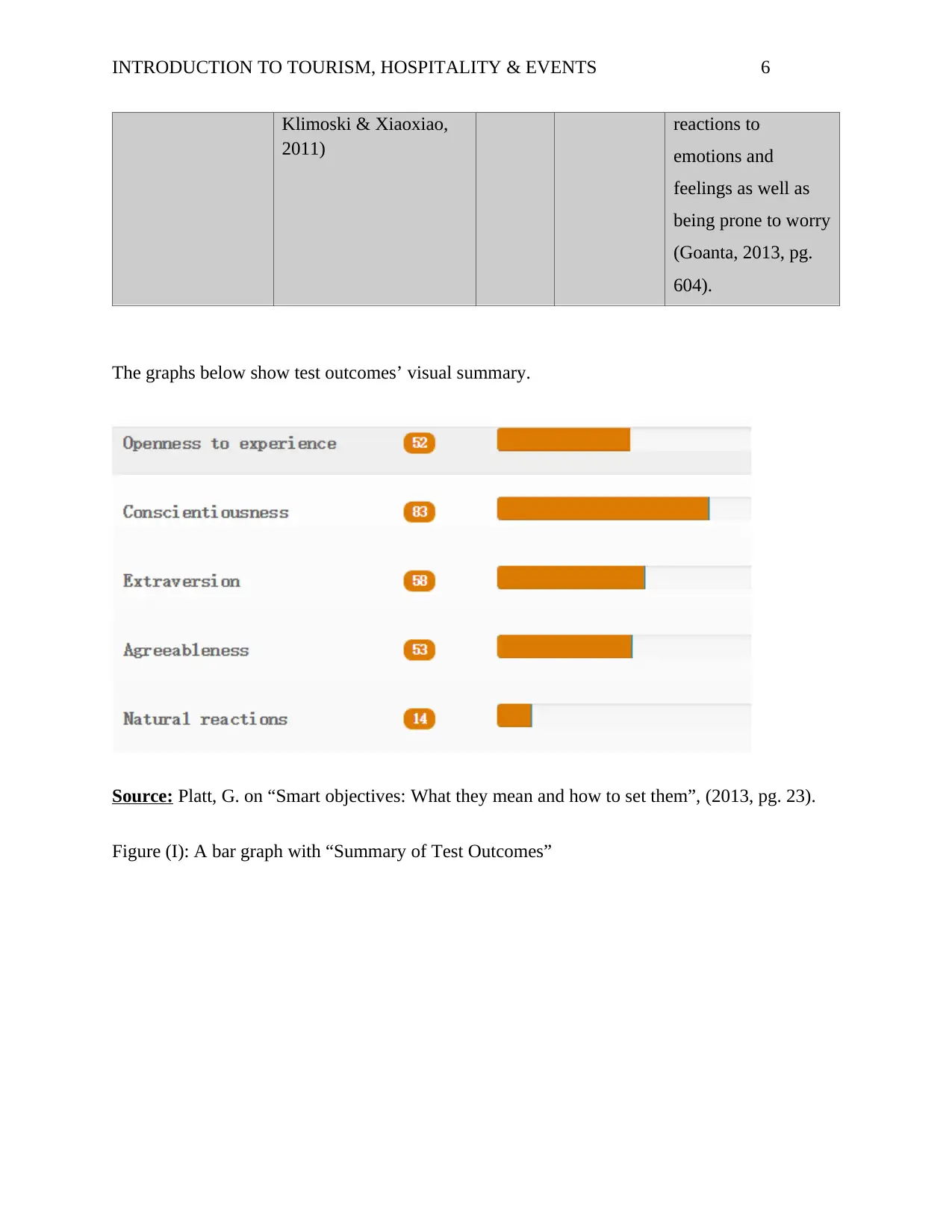
INTRODUCTION TO TOURISM, HOSPITALITY & EVENTS 6
Klimoski & Xiaoxiao,
2011)
reactions to
emotions and
feelings as well as
being prone to worry
(Goanta, 2013, pg.
604).
The graphs below show test outcomes’ visual summary.
Source: Platt, G. on “Smart objectives: What they mean and how to set them”, (2013, pg. 23).
Figure (I): A bar graph with “Summary of Test Outcomes”
Klimoski & Xiaoxiao,
2011)
reactions to
emotions and
feelings as well as
being prone to worry
(Goanta, 2013, pg.
604).
The graphs below show test outcomes’ visual summary.
Source: Platt, G. on “Smart objectives: What they mean and how to set them”, (2013, pg. 23).
Figure (I): A bar graph with “Summary of Test Outcomes”
⊘ This is a preview!⊘
Do you want full access?
Subscribe today to unlock all pages.

Trusted by 1+ million students worldwide
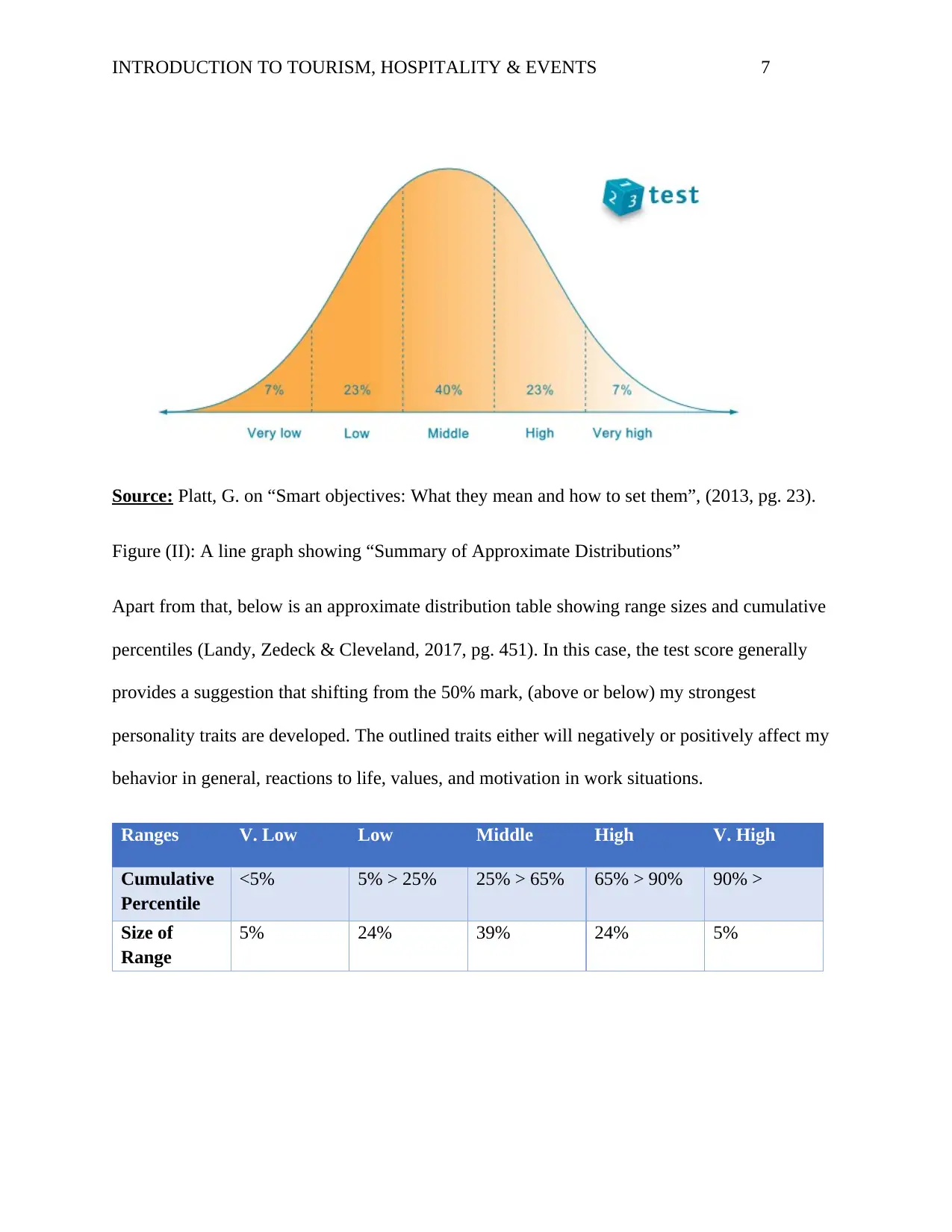
INTRODUCTION TO TOURISM, HOSPITALITY & EVENTS 7
Source: Platt, G. on “Smart objectives: What they mean and how to set them”, (2013, pg. 23).
Figure (II): A line graph showing “Summary of Approximate Distributions”
Apart from that, below is an approximate distribution table showing range sizes and cumulative
percentiles (Landy, Zedeck & Cleveland, 2017, pg. 451). In this case, the test score generally
provides a suggestion that shifting from the 50% mark, (above or below) my strongest
personality traits are developed. The outlined traits either will negatively or positively affect my
behavior in general, reactions to life, values, and motivation in work situations.
Ranges V. Low Low Middle High V. High
Cumulative
Percentile
<5% 5% > 25% 25% > 65% 65% > 90% 90% >
Size of
Range
5% 24% 39% 24% 5%
Source: Platt, G. on “Smart objectives: What they mean and how to set them”, (2013, pg. 23).
Figure (II): A line graph showing “Summary of Approximate Distributions”
Apart from that, below is an approximate distribution table showing range sizes and cumulative
percentiles (Landy, Zedeck & Cleveland, 2017, pg. 451). In this case, the test score generally
provides a suggestion that shifting from the 50% mark, (above or below) my strongest
personality traits are developed. The outlined traits either will negatively or positively affect my
behavior in general, reactions to life, values, and motivation in work situations.
Ranges V. Low Low Middle High V. High
Cumulative
Percentile
<5% 5% > 25% 25% > 65% 65% > 90% 90% >
Size of
Range
5% 24% 39% 24% 5%
Paraphrase This Document
Need a fresh take? Get an instant paraphrase of this document with our AI Paraphraser
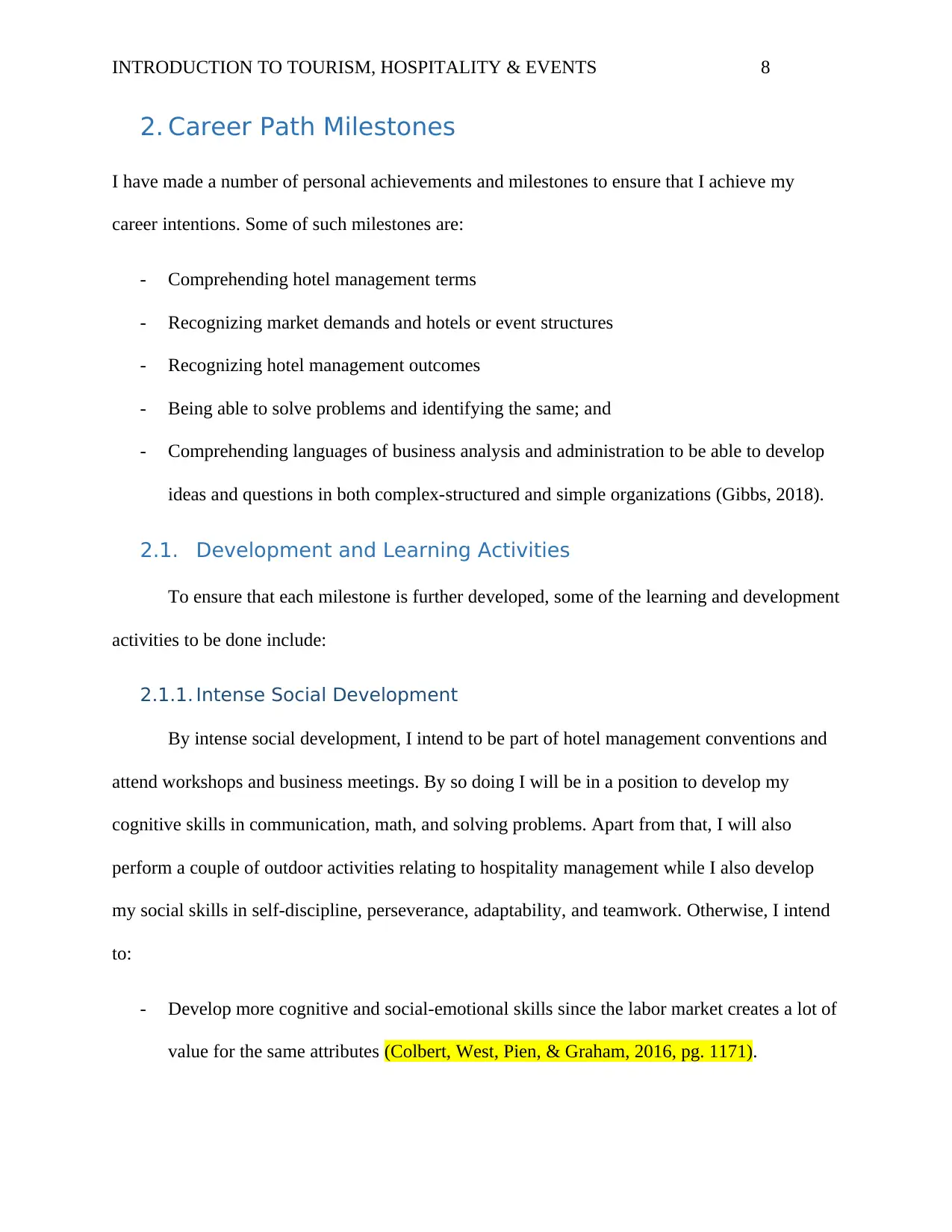
INTRODUCTION TO TOURISM, HOSPITALITY & EVENTS 8
2. Career Path Milestones
I have made a number of personal achievements and milestones to ensure that I achieve my
career intentions. Some of such milestones are:
- Comprehending hotel management terms
- Recognizing market demands and hotels or event structures
- Recognizing hotel management outcomes
- Being able to solve problems and identifying the same; and
- Comprehending languages of business analysis and administration to be able to develop
ideas and questions in both complex-structured and simple organizations (Gibbs, 2018).
2.1. Development and Learning Activities
To ensure that each milestone is further developed, some of the learning and development
activities to be done include:
2.1.1. Intense Social Development
By intense social development, I intend to be part of hotel management conventions and
attend workshops and business meetings. By so doing I will be in a position to develop my
cognitive skills in communication, math, and solving problems. Apart from that, I will also
perform a couple of outdoor activities relating to hospitality management while I also develop
my social skills in self-discipline, perseverance, adaptability, and teamwork. Otherwise, I intend
to:
- Develop more cognitive and social-emotional skills since the labor market creates a lot of
value for the same attributes (Colbert, West, Pien, & Graham, 2016, pg. 1171).
2. Career Path Milestones
I have made a number of personal achievements and milestones to ensure that I achieve my
career intentions. Some of such milestones are:
- Comprehending hotel management terms
- Recognizing market demands and hotels or event structures
- Recognizing hotel management outcomes
- Being able to solve problems and identifying the same; and
- Comprehending languages of business analysis and administration to be able to develop
ideas and questions in both complex-structured and simple organizations (Gibbs, 2018).
2.1. Development and Learning Activities
To ensure that each milestone is further developed, some of the learning and development
activities to be done include:
2.1.1. Intense Social Development
By intense social development, I intend to be part of hotel management conventions and
attend workshops and business meetings. By so doing I will be in a position to develop my
cognitive skills in communication, math, and solving problems. Apart from that, I will also
perform a couple of outdoor activities relating to hospitality management while I also develop
my social skills in self-discipline, perseverance, adaptability, and teamwork. Otherwise, I intend
to:
- Develop more cognitive and social-emotional skills since the labor market creates a lot of
value for the same attributes (Colbert, West, Pien, & Graham, 2016, pg. 1171).
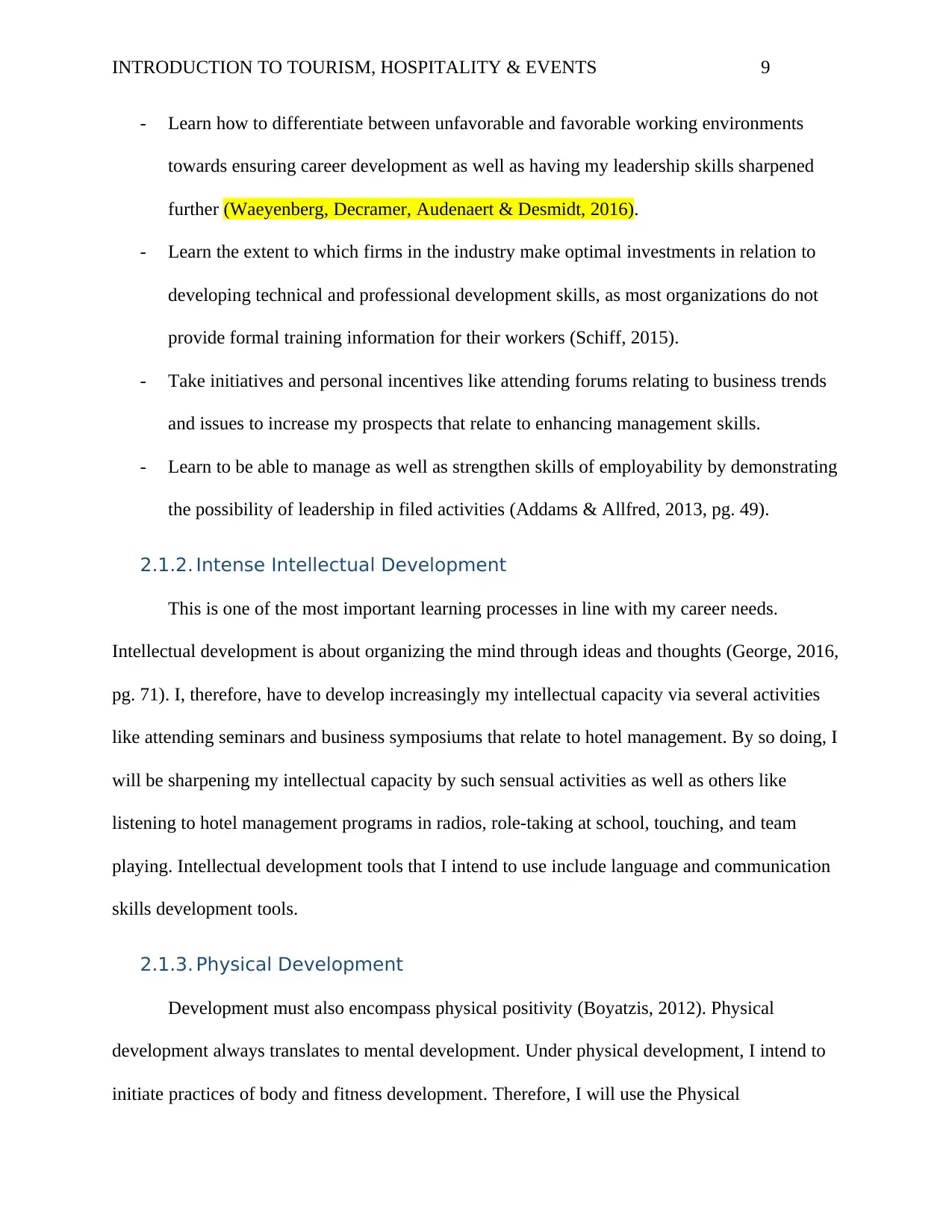
INTRODUCTION TO TOURISM, HOSPITALITY & EVENTS 9
- Learn how to differentiate between unfavorable and favorable working environments
towards ensuring career development as well as having my leadership skills sharpened
further (Waeyenberg, Decramer, Audenaert & Desmidt, 2016).
- Learn the extent to which firms in the industry make optimal investments in relation to
developing technical and professional development skills, as most organizations do not
provide formal training information for their workers (Schiff, 2015).
- Take initiatives and personal incentives like attending forums relating to business trends
and issues to increase my prospects that relate to enhancing management skills.
- Learn to be able to manage as well as strengthen skills of employability by demonstrating
the possibility of leadership in filed activities (Addams & Allfred, 2013, pg. 49).
2.1.2. Intense Intellectual Development
This is one of the most important learning processes in line with my career needs.
Intellectual development is about organizing the mind through ideas and thoughts (George, 2016,
pg. 71). I, therefore, have to develop increasingly my intellectual capacity via several activities
like attending seminars and business symposiums that relate to hotel management. By so doing, I
will be sharpening my intellectual capacity by such sensual activities as well as others like
listening to hotel management programs in radios, role-taking at school, touching, and team
playing. Intellectual development tools that I intend to use include language and communication
skills development tools.
2.1.3. Physical Development
Development must also encompass physical positivity (Boyatzis, 2012). Physical
development always translates to mental development. Under physical development, I intend to
initiate practices of body and fitness development. Therefore, I will use the Physical
- Learn how to differentiate between unfavorable and favorable working environments
towards ensuring career development as well as having my leadership skills sharpened
further (Waeyenberg, Decramer, Audenaert & Desmidt, 2016).
- Learn the extent to which firms in the industry make optimal investments in relation to
developing technical and professional development skills, as most organizations do not
provide formal training information for their workers (Schiff, 2015).
- Take initiatives and personal incentives like attending forums relating to business trends
and issues to increase my prospects that relate to enhancing management skills.
- Learn to be able to manage as well as strengthen skills of employability by demonstrating
the possibility of leadership in filed activities (Addams & Allfred, 2013, pg. 49).
2.1.2. Intense Intellectual Development
This is one of the most important learning processes in line with my career needs.
Intellectual development is about organizing the mind through ideas and thoughts (George, 2016,
pg. 71). I, therefore, have to develop increasingly my intellectual capacity via several activities
like attending seminars and business symposiums that relate to hotel management. By so doing, I
will be sharpening my intellectual capacity by such sensual activities as well as others like
listening to hotel management programs in radios, role-taking at school, touching, and team
playing. Intellectual development tools that I intend to use include language and communication
skills development tools.
2.1.3. Physical Development
Development must also encompass physical positivity (Boyatzis, 2012). Physical
development always translates to mental development. Under physical development, I intend to
initiate practices of body and fitness development. Therefore, I will use the Physical
⊘ This is a preview!⊘
Do you want full access?
Subscribe today to unlock all pages.

Trusted by 1+ million students worldwide
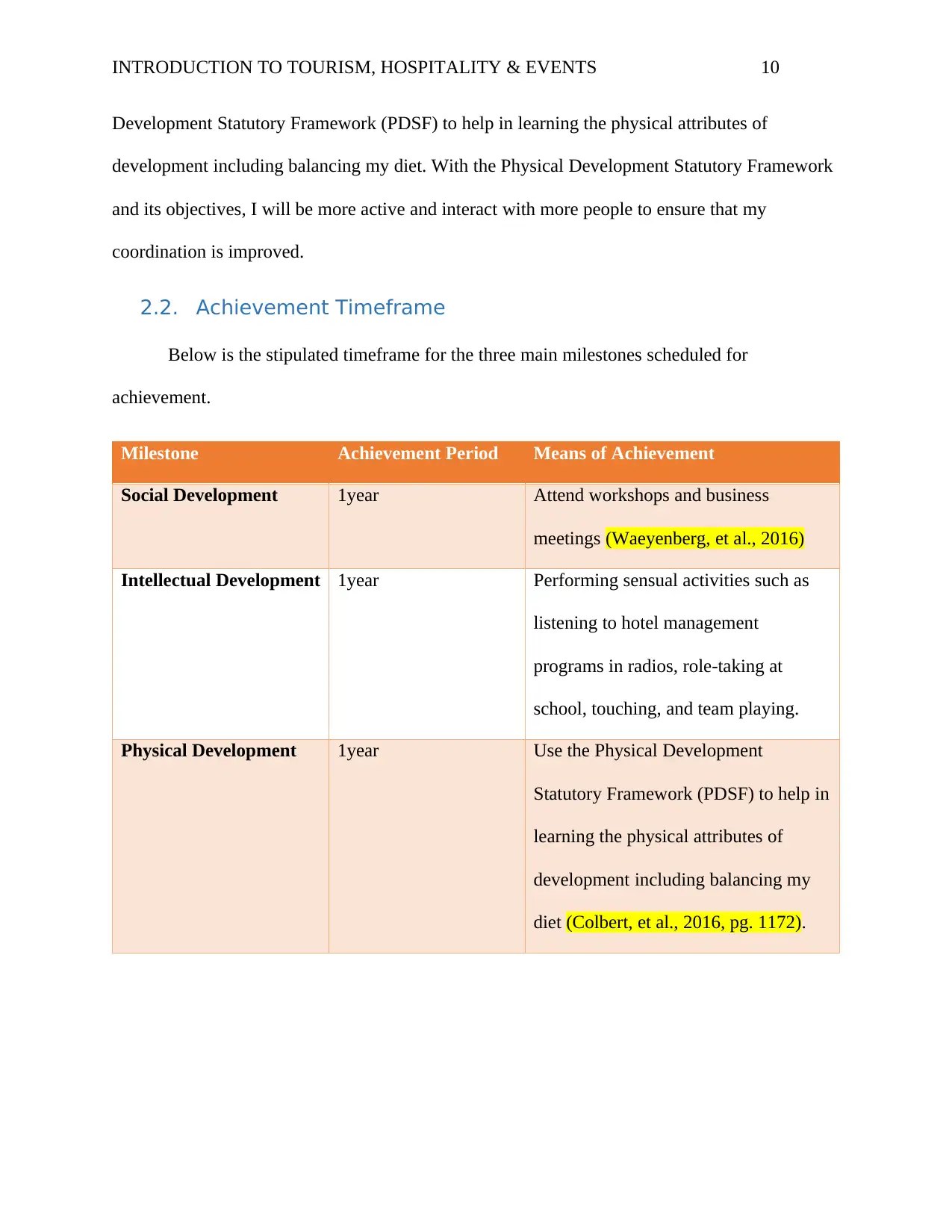
INTRODUCTION TO TOURISM, HOSPITALITY & EVENTS 10
Development Statutory Framework (PDSF) to help in learning the physical attributes of
development including balancing my diet. With the Physical Development Statutory Framework
and its objectives, I will be more active and interact with more people to ensure that my
coordination is improved.
2.2. Achievement Timeframe
Below is the stipulated timeframe for the three main milestones scheduled for
achievement.
Milestone Achievement Period Means of Achievement
Social Development 1year Attend workshops and business
meetings (Waeyenberg, et al., 2016)
Intellectual Development 1year Performing sensual activities such as
listening to hotel management
programs in radios, role-taking at
school, touching, and team playing.
Physical Development 1year Use the Physical Development
Statutory Framework (PDSF) to help in
learning the physical attributes of
development including balancing my
diet (Colbert, et al., 2016, pg. 1172).
Development Statutory Framework (PDSF) to help in learning the physical attributes of
development including balancing my diet. With the Physical Development Statutory Framework
and its objectives, I will be more active and interact with more people to ensure that my
coordination is improved.
2.2. Achievement Timeframe
Below is the stipulated timeframe for the three main milestones scheduled for
achievement.
Milestone Achievement Period Means of Achievement
Social Development 1year Attend workshops and business
meetings (Waeyenberg, et al., 2016)
Intellectual Development 1year Performing sensual activities such as
listening to hotel management
programs in radios, role-taking at
school, touching, and team playing.
Physical Development 1year Use the Physical Development
Statutory Framework (PDSF) to help in
learning the physical attributes of
development including balancing my
diet (Colbert, et al., 2016, pg. 1172).
Paraphrase This Document
Need a fresh take? Get an instant paraphrase of this document with our AI Paraphraser
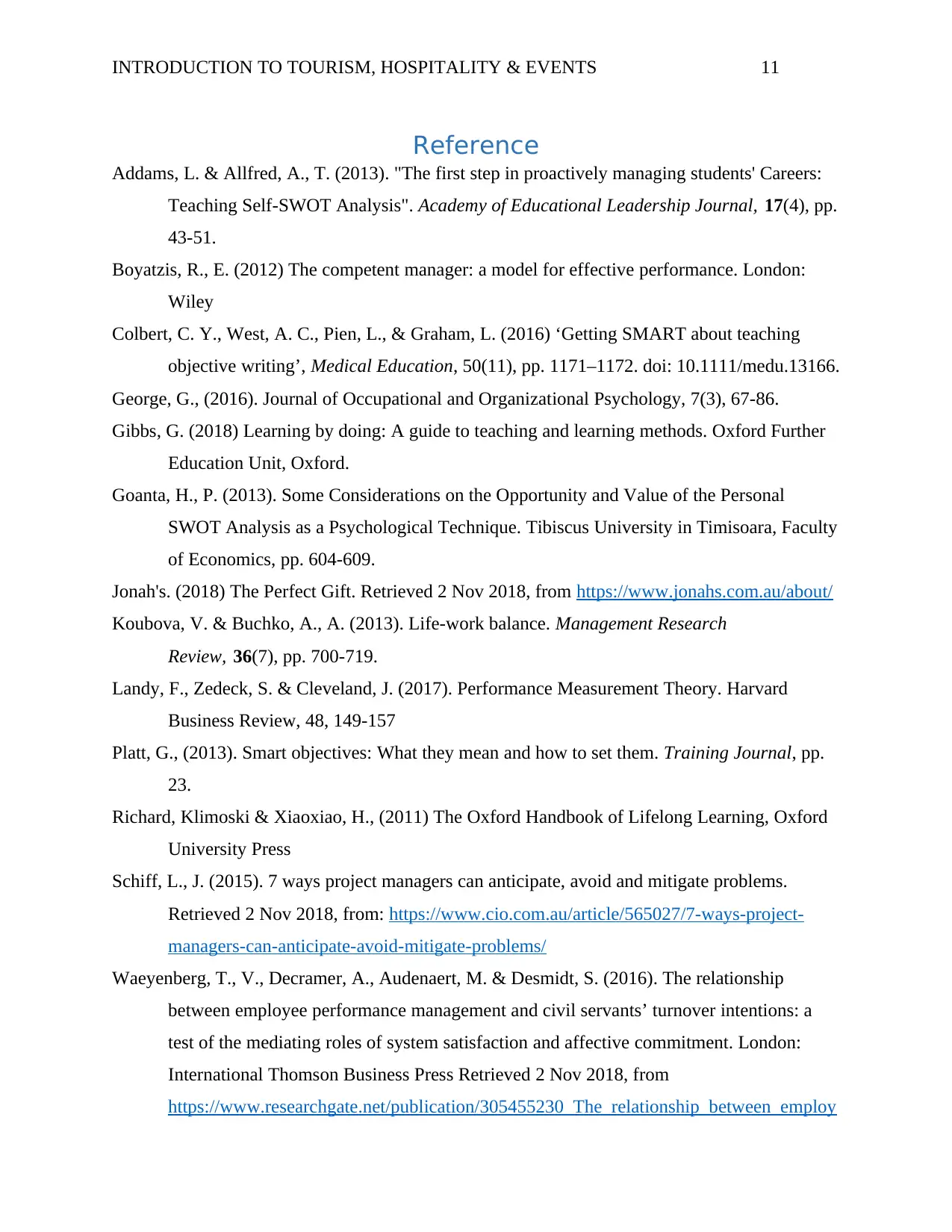
INTRODUCTION TO TOURISM, HOSPITALITY & EVENTS 11
Reference
Addams, L. & Allfred, A., T. (2013). "The first step in proactively managing students' Careers:
Teaching Self-SWOT Analysis". Academy of Educational Leadership Journal, 17(4), pp.
43-51.
Boyatzis, R., E. (2012) The competent manager: a model for effective performance. London:
Wiley
Colbert, C. Y., West, A. C., Pien, L., & Graham, L. (2016) ‘Getting SMART about teaching
objective writing’, Medical Education, 50(11), pp. 1171–1172. doi: 10.1111/medu.13166.
George, G., (2016). Journal of Occupational and Organizational Psychology, 7(3), 67-86.
Gibbs, G. (2018) Learning by doing: A guide to teaching and learning methods. Oxford Further
Education Unit, Oxford.
Goanta, H., P. (2013). Some Considerations on the Opportunity and Value of the Personal
SWOT Analysis as a Psychological Technique. Tibiscus University in Timisoara, Faculty
of Economics, pp. 604-609.
Jonah's. (2018) The Perfect Gift. Retrieved 2 Nov 2018, from https://www.jonahs.com.au/about/
Koubova, V. & Buchko, A., A. (2013). Life-work balance. Management Research
Review, 36(7), pp. 700-719.
Landy, F., Zedeck, S. & Cleveland, J. (2017). Performance Measurement Theory. Harvard
Business Review, 48, 149-157
Platt, G., (2013). Smart objectives: What they mean and how to set them. Training Journal, pp.
23.
Richard, Klimoski & Xiaoxiao, H., (2011) The Oxford Handbook of Lifelong Learning, Oxford
University Press
Schiff, L., J. (2015). 7 ways project managers can anticipate, avoid and mitigate problems.
Retrieved 2 Nov 2018, from: https://www.cio.com.au/article/565027/7-ways-project-
managers-can-anticipate-avoid-mitigate-problems/
Waeyenberg, T., V., Decramer, A., Audenaert, M. & Desmidt, S. (2016). The relationship
between employee performance management and civil servants’ turnover intentions: a
test of the mediating roles of system satisfaction and affective commitment. London:
International Thomson Business Press Retrieved 2 Nov 2018, from
https://www.researchgate.net/publication/305455230_The_relationship_between_employ
Reference
Addams, L. & Allfred, A., T. (2013). "The first step in proactively managing students' Careers:
Teaching Self-SWOT Analysis". Academy of Educational Leadership Journal, 17(4), pp.
43-51.
Boyatzis, R., E. (2012) The competent manager: a model for effective performance. London:
Wiley
Colbert, C. Y., West, A. C., Pien, L., & Graham, L. (2016) ‘Getting SMART about teaching
objective writing’, Medical Education, 50(11), pp. 1171–1172. doi: 10.1111/medu.13166.
George, G., (2016). Journal of Occupational and Organizational Psychology, 7(3), 67-86.
Gibbs, G. (2018) Learning by doing: A guide to teaching and learning methods. Oxford Further
Education Unit, Oxford.
Goanta, H., P. (2013). Some Considerations on the Opportunity and Value of the Personal
SWOT Analysis as a Psychological Technique. Tibiscus University in Timisoara, Faculty
of Economics, pp. 604-609.
Jonah's. (2018) The Perfect Gift. Retrieved 2 Nov 2018, from https://www.jonahs.com.au/about/
Koubova, V. & Buchko, A., A. (2013). Life-work balance. Management Research
Review, 36(7), pp. 700-719.
Landy, F., Zedeck, S. & Cleveland, J. (2017). Performance Measurement Theory. Harvard
Business Review, 48, 149-157
Platt, G., (2013). Smart objectives: What they mean and how to set them. Training Journal, pp.
23.
Richard, Klimoski & Xiaoxiao, H., (2011) The Oxford Handbook of Lifelong Learning, Oxford
University Press
Schiff, L., J. (2015). 7 ways project managers can anticipate, avoid and mitigate problems.
Retrieved 2 Nov 2018, from: https://www.cio.com.au/article/565027/7-ways-project-
managers-can-anticipate-avoid-mitigate-problems/
Waeyenberg, T., V., Decramer, A., Audenaert, M. & Desmidt, S. (2016). The relationship
between employee performance management and civil servants’ turnover intentions: a
test of the mediating roles of system satisfaction and affective commitment. London:
International Thomson Business Press Retrieved 2 Nov 2018, from
https://www.researchgate.net/publication/305455230_The_relationship_between_employ
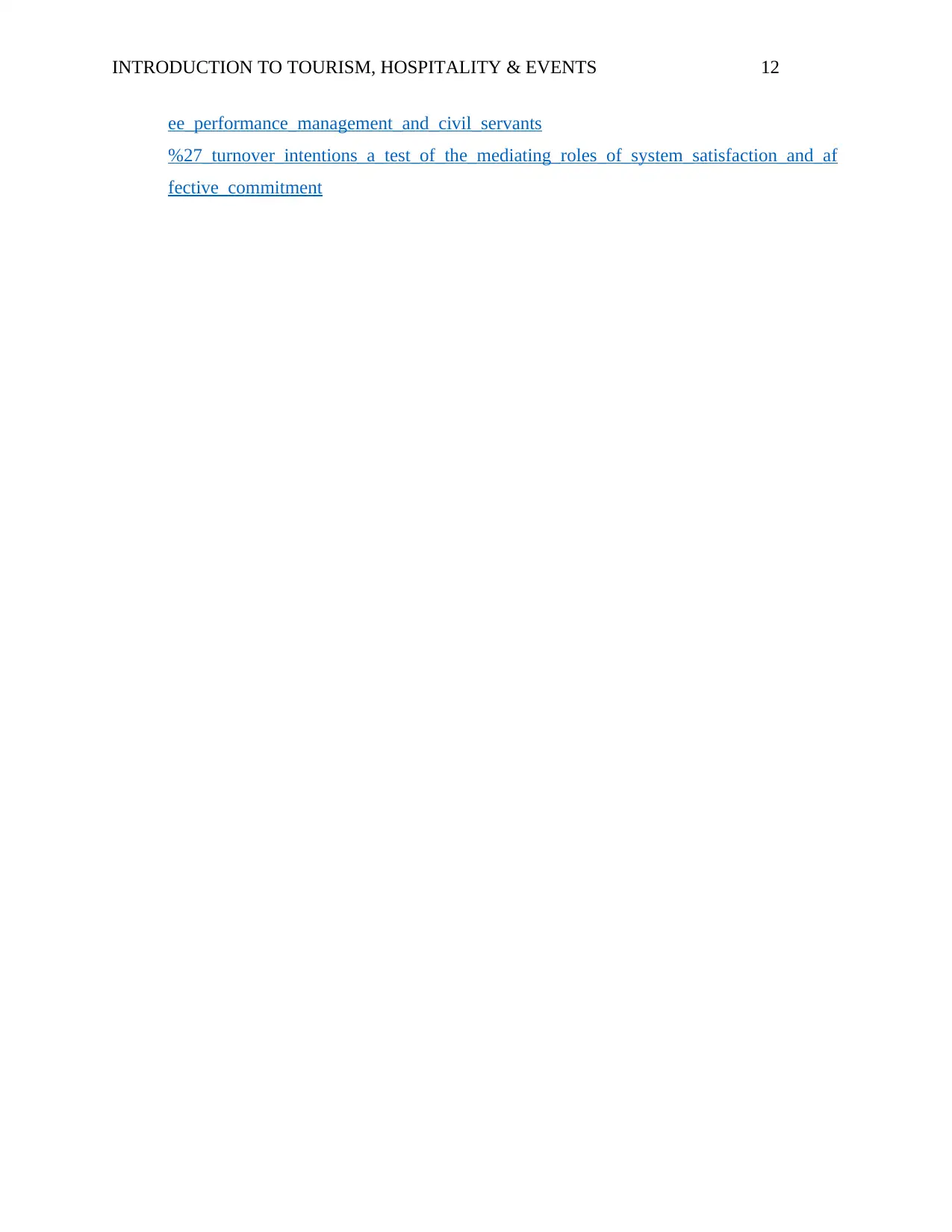
INTRODUCTION TO TOURISM, HOSPITALITY & EVENTS 12
ee_performance_management_and_civil_servants
%27_turnover_intentions_a_test_of_the_mediating_roles_of_system_satisfaction_and_af
fective_commitment
ee_performance_management_and_civil_servants
%27_turnover_intentions_a_test_of_the_mediating_roles_of_system_satisfaction_and_af
fective_commitment
⊘ This is a preview!⊘
Do you want full access?
Subscribe today to unlock all pages.

Trusted by 1+ million students worldwide
1 out of 13
Related Documents
Your All-in-One AI-Powered Toolkit for Academic Success.
+13062052269
info@desklib.com
Available 24*7 on WhatsApp / Email
![[object Object]](/_next/static/media/star-bottom.7253800d.svg)
Unlock your academic potential
Copyright © 2020–2026 A2Z Services. All Rights Reserved. Developed and managed by ZUCOL.





